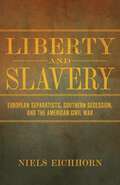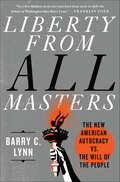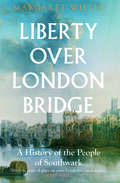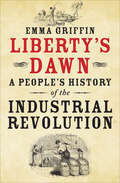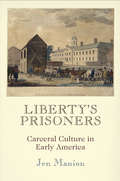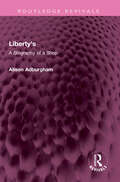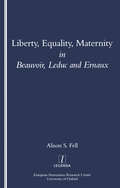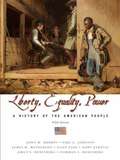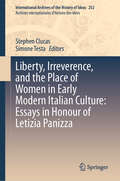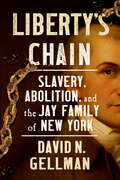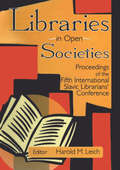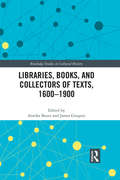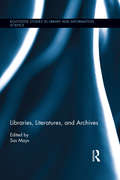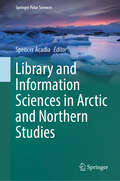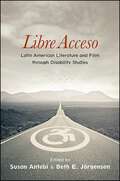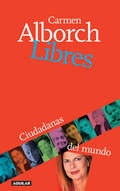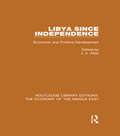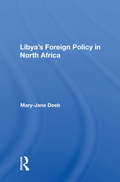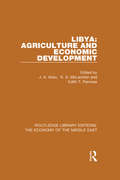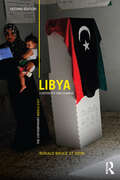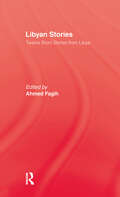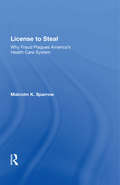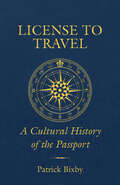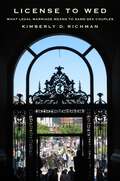- Table View
- List View
Liberty and Slavery: European Separatists, Southern Secession, and the American Civil War (Conflicting Worlds: New Dimensions of the American Civil War)
by Niels EichhornIn Liberty and Slavery, Niels Eichhorn examines the language of slavery, which he considers central to revolutionary struggles, especially those waged in Europe in the nineteenth century. Eichhorn begins in 1830 with separatist movements in Greece, Belgium, and Poland, which laid the foundation for rebellions undertaken later in the century, and then shifts focus to the 1848 uprisings in Ireland, Hungary, and Schleswig-Holstein. He argues that revolutionaries embraced or rejected the language of slavery as they saw fit, using it to justify their rebellions and larger goals. The failure of these insurgencies propelled a wave of revolutionary migrants across the Atlantic world. Those who journeyed to the United States felt the need to adjust to the political and sectional divisions in their new home. Eichhorn shows that separatism was widespread during this period; the secessionist aims of the American Confederacy were by no means unique. Additionally, Eichhorn explores these migrants’ motivations for shunning the Confederacy during the American Civil War. Having been steeped in the language of slavery and separatism, they naturally sided with the Union when the sectional crisis culminated in civil war in 1861.
Liberty from All Masters: The New American Autocracy vs. the Will of the People
by Barry C. LynnBarry C. Lynn, one of America's preeminent thinkers, provides the clearest statement yet on the nature and magnitude of the political and economic dangers posed by America’s new monopolies in Liberty from All Masters."Very few thinkers in recent years have done more to shift the debate in Washington than Barry Lynn."—Franklin Foer Americans are obsessed with liberty, mad about liberty. On any day, we can tune into arguments about how much liberty we need to buy a gun or get an abortion, to marry who we want or adopt the gender we feel. We argue endlessly about liberty from regulation and observation by the state, and proudly rebel against the tyranny of course syllabi and Pandora playlists. Redesign the penny today and the motto would read “You ain’t the boss of me.”Yet Americans are only now awakening to what is perhaps the gravest domestic threat to our liberties in a century—in the form of an extreme and fast-growing concentration of economic power. Monopolists today control almost every corner of the American economy. The result is not only lower wages and higher prices, hence a concentration of wealth and power in the hands of the few. The result is also a stripping away of our liberty to work how and where we want, to launch and grow the businesses we want, to create the communities and families and lives we want. The rise of online monopolists such as Google and Amazon—designed to gather our most intimate secrets and use them to manipulate our personal and group actions—is making the problem only far worse fast. Not only have these giant corporations captured the ability to manage how we share news and ideas with one another, they increasingly enjoy the power to shape how we move and play and speak and think.
Liberty over London Bridge: A History of the People of Southwark
by Margaret WillesThe first complete history of Southwark, London&’s stubbornly independent community over the Thames Southwark&’s fortunes have always been tied to those of the City of London across the river. But from its founding in Roman times through to flourishing in the medieval era, the Borough has always fiercely asserted its independence. A place of licence, largely free of the City&’s jurisdiction, Southwark became a constant thorn in London&’s side: an administrative anachronism, a commercial rival, and an asylum for undesirable industries and residents. In this remarkable history of London&’s liberty beyond the bridge, Margaret Willes narrates the life and times of the people of Southwark, capturing the Borough&’s anarchic spirit of revelry. Populated by a potent mix of talented immigrants, religious dissenters, theatrical folk, brewers, and sex workers, Southwark often escaped urban jurisdiction—giving it an atmosphere of danger, misrule, and artistic freedom. Tracing Southwark&’s history from its Roman foundation to its present popularity as a place to visit, through Chaucer, to Shakespeare, and on to Dickens, Willes offers an indispensable exploration of the City&’s unacknowledged mirror image.
Liberty's Dawn: A People's History of the Industrial Revolution
by Emma Griffin&“Emma Griffin gives a new and powerful voice to the men and women whose blood and sweat greased the wheels of the Industrial Revolution&” (Tim Hitchcock, author of Down and Out in Eighteenth-Century London). This &“provocative study&” looks at hundreds of autobiographies penned between 1760 and 1900 to offer an intimate firsthand account of how the Industrial Revolution was experienced by the working class (The New Yorker). The era didn&’t just bring about misery and poverty. On the contrary, Emma Griffin shows how it raised incomes, improved literacy, and offered exciting opportunities for political action. For many, this was a period of new, and much valued, sexual and cultural freedom. This rich personal account focuses on the social impact of the Industrial Revolution, rather than its economic and political histories. In the tradition of bestselling books by Liza Picard, Judith Flanders, and Jerry White, Griffin gets under the skin of the period and creates a cast of colorful characters, including factory workers, miners, shoemakers, carpenters, servants, and farm laborers. &“Through the &‘messy tales&’ of more than 350 working-class lives, Emma Griffin arrives at an upbeat interpretation of the Industrial Revolution most of us would hardly recognize. It is quite enthralling.&” —The Oldie magazine &“A triumph, achieved in fewer than 250 gracefully written pages. They persuasively purvey Griffin&’s historical conviction. She is intimate with her audience, wooing it and teasing it along the way.&” —The Times Literary Supplement &“An admirably intimate and expansive revisionist history.&” —Publishers Weekly
Liberty's Prisoners: Carceral Culture in Early America (Early American Studies)
by Jen ManionLiberty's Prisoners examines how changing attitudes about work, freedom, property, and family shaped the creation of the penitentiary system in the United States. The first penitentiary was founded in Philadelphia in 1790, a period of great optimism and turmoil in the Revolution's wake. Those who were previously dependents with no legal standing—women, enslaved people, and indentured servants—increasingly claimed their own right to life, liberty, and happiness. A diverse cast of women and men, including immigrants, African Americans, and the Irish and Anglo-American poor, struggled to make a living. Vagrancy laws were used to crack down on those who visibly challenged longstanding social hierarchies while criminal convictions carried severe sentences for even the most trivial property crimes.The penitentiary was designed to reestablish order, both behind its walls and in society at large, but the promise of reformative incarceration failed from its earliest years. Within this system, women served a vital function, and Liberty's Prisoners is the first book to bring to life the experience of African American, immigrant, and poor white women imprisoned in early America. Always a minority of prisoners, women provided domestic labor within the institution and served as model inmates, more likely to submit to the authority of guards, inspectors, and reformers. White men, the primary targets of reformative incarceration, challenged authorities at every turn while African American men were increasingly segregated and denied access to reform.Liberty's Prisoners chronicles how the penitentiary, though initially designed as an alternative to corporal punishment for the most egregious of offenders, quickly became a repository for those who attempted to lay claim to the new nation's promise of liberty.
Liberty's: A Biography of a Shop (Routledge Revivals)
by Alison AdburghamFirst published in 1975, Liberty’s is the biography of a shop and its various owners in London. Responding to the social pressures, class patterns, and governmental policies, the developments in the shop mimic the social changes taking place in London. It is affected by war and depressions, by trade booms and enemy bombs, by changes in fashions and taste. Liberty’s not only reflected these changes but also contributed to the artistic movements and the development of fashionable taste. This book will be of interest to students of history, fashion and sociology.
Liberty, Equality, Maternity
by Alison Fell"The concept of motherhood emerges strongly in the writings of Simone de Beauvoir, Violette Leduc and Annie Ernaux, whose work is examined here in the light of current debates about women's reproductive function and the longstanding glorification of the mere au foyer in France, driven by fear of a falling population. In this interdisciplinary study of twentieth-century French women's writing, Fell uncovers tensions at the heart of the literary critique. She shows these authors challenging the patriarchal view of motherhood as the sole justification for a woman's existence while at the same time confronting the conflict inherent in their relationship with their own mothers. A survey of theoretical and historical material demonstrates vividly that the changing concept of motherhood remains a problematic and highly contentious issue for French feminists, whether writing in 1940 or 1999."
Liberty, Equality, Power: A History of the American People
by James M. Mcpherson Gary Gerstle Emily S. Rosenberg Norman L. Rosenberg John M. Murrin Alice Fahs Paul E. JohnsonIntegrating social and cultural history, this college textbook tells the political story of a country that, over a relatively brief period, transformed itself into the most powerful nation on earth, and explores the role of power in shaping American politics, society, and economics. The fifth edition adds a final chapter on Presidents Clinton and Bush. Annotation ©2007 Book News, Inc., Portland, OR (booknews.com)
Liberty, Irreverence, and the Place of Women in Early Modern Italian Culture: Essays in Honour of Letizia Panizza (International Archives of the History of Ideas Archives internationales d'histoire des idées #252)
by Stephen Clucas Simone TestaThis book brings together essays from a range of disciplines within Early Modern Italian Studies, which focus on research areas pioneered by the prestigious Italianist, Letizia Panizza. The essays cover numerous themes, mirroring Panizza's broad scholarly interests, and refusal of artificial disciplinary separations. Contributions come from the fields of women's history, cultural history, intellectual history, political philosophy, and art history. They span from Giordano Bruno and the Renaissance interest in the lives of classical philosophers to the poetry of women in the Italian academies, representations of women in Ludovico Ariosto's Orlando Furioso, and the poetry of Piero de Medici. The volume ends with essays on religious parody, libertinism, and controversial political writings. This book presents original new work by leading scholars in the intellectual, cultural and literary history of early modern Italy and is aimed at scholars of intellectual history, history of philosophy, literary history, women’s studies and Italian history.
Liberty’s Chain: Slavery, Abolition, and the Jay Family of New York
by David N. GellmanIn Liberty's Chain, David N. Gellman shows how the Jay family, abolitionists and slaveholders alike, embodied the contradictions of the revolutionary age. The Jays of New York were a preeminent founding family. John Jay, diplomat, Supreme Court justice, and coauthor of the Federalist Papers, and his children and grandchildren helped chart the course of the Early American Republic. Liberty's Chain forges a new path for thinking about slavery and the nation's founding. John Jay served as the inaugural president of a pioneering antislavery society. His descendants, especially his son William Jay and his grandson John Jay II, embraced radical abolitionism in the nineteenth century, the cause most likely to rend the nation. The scorn of their elite peers—and racist mobs—did not deter their commitment to end southern slavery and to combat northern injustice. John Jay's personal dealings with African Americans ranged from callousness to caring. Across the generations, even as prominent Jays decried human servitude, enslaved people and formerly enslaved people served in Jay households. Abbe, Clarinda, Caesar Valentine, Zilpah Montgomery, and others lived difficult, often isolated, lives that tested their courage and the Jay family's principles.The personal and the political intersect in this saga, as Gellman charts American values transmitted and transformed from the colonial and revolutionary eras to the Civil War, Reconstruction, and beyond. The Jays, as well as those who served them, demonstrated the elusiveness and the vitality of liberty's legacy. This remarkable family story forces us to grapple with what we mean by patriotism, conservatism, and radicalism. Their story speaks directly to our own divided times.
Libraries in Open Societies: Proceedings of the Fifth International Slavic Librarians' Conference
by Harold LeichLearn how libraries have risen to the challenges created by the fall of Communism and the rise of information technology! How do librarians and researchers face war, social upheaval, and other challenges after the fall of Communism and the rise of digital technology? Libraries in Open Societies offers fascinating answers to this and many other questions while providing an overview of this rapidly changing arena. An international panel of authors who know the specialized concerns of libraries in Eastern Europe and the former USSR addresses topics that include the difficulty of preserving and acquiring materials, the importance of international cooperation, and the benefits and pitfalls of electronic media. This book also discusses the rise of the Internet in Russia, the movement of international bibliographies onto the Web, and other features of the digital revolution. Libraries in Open Societies, itself an example of the value of international cooperation in the modern world, will be an important addition to your bookshelves! Other absorbing topics in Libraries in Open Societies include: reconstruction of libraries in Bosnia the role of the Polish émigré press in Great Britain guidelines for developing Slavic literature collections the creation and restoration of digital archives throughout the region electronic information delivery in the United States and abroad journals in Slavic and East European librarianship Baltic collections in North America and Western Europe the role digital technologies have played in restoring Bosnian printed heritage materials lost during the 1992–1995 war
Libraries, Books, and Collectors of Texts, 1600-1900 (Routledge Studies in Cultural History #61)
by James Gregory Annika BautzThis book presents the collectors’ roles as prominently as the collections of books and texts which they assembled. Contributors explore the activities and networks shaping a range of continental and transcontinental European public and private collections during the Renaissance, Enlightenment and modern eras. They study the impact of class, geographical location and specific cultural contexts on the gathering and use of printed and handwritten texts and other printed artefacts. The volume explores the social dimension of book collecting, and considers how practices of collecting developed during these periods of profound cultural, social and political change.
Libraries, Literatures, and Archives (Routledge Studies in Library and Information Science)
by Sas MaysNot only does the library have a long and complex history and politics, but it has an ambivalent presence in Western culture – both a site of positive knowledge and a site of error, confusion, and loss. Nevertheless, in literary studies and in the humanities, including book history, the figure of the library remains in many senses under-researched. This collection brings together established and up-and-coming researchers from a number of practices – literary and cultural studies, gender studies, book history, philosophy, visual culture, and contemporary art –with an effective historical sweep ranging from the time of Sumer to the present day. In the context of the rise of archive studies, this book attends specifically and meta-critically to the figure of the library as a particular archival form, considering the traits that constitute (or fail to constitute) the library as institution or idea, and questions its relations to other accumulative modes, such as the archive in its traditional sense, the museum, or the filmic or digital archive. Across their diversity, and in addition to their international standard of research and writing, each chapter is unified by commitment to analyzing the complex cultural politics of the library form.
Library and Information Sciences in Arctic and Northern Studies (Springer Polar Sciences)
by Spencer AcadiaThe role of library and information sciences (LIS) in, for, and about Arctic and Northern studies is underexplored. This book examines the intersection of LIS and Arctic/Northern scholarship, research, and study by considering the Arctic and North as a global information-knowledge society; demonstrates practical and applied ways that librarians, archivists, curators, and other information scholars and professionals can participate and have participated in real activities within Arctic and Northern environments; explains how LIS – as a discipline focused on data, information, and knowledge – has a significant role to play in Arctic and Northern endeavours; and emphasises the inter-/multi- disciplinary nature of what are Arctic studies and Northern studies and the placement of LIS into that structure. Even though LIS has historically been overlooked in Northern and Arctic matters, this book suggests that LIS is in a remarkable position to add value to future Arctic/Northern studies. Thisbook is of interest to scientists, researchers, scholars, educators, professionals, and students globally working in Northern and Arctic contexts and/or with Northern and Arctic pursuits in mind.
Libre Acceso: Latin American Literature and Film through Disability Studies (SUNY series in Latin American and Iberian Thought and Culture)
by Susan Antebi; Beth E. JörgensenLibre Acceso stages an innovative encounter between disciplines that have remained quite separate: Latin American literary, film, and cultural studies and disability studies. It offers a much-needed framework to engage the representation, construction, embodiment, and contestation of human differences, and provides tools for the urgent resignification of a robust and diverse Latin American literary and filmic tradition. The contributors discuss such topics as impairment, trauma, illness and the body, performance, queer theory, subaltern studies, and human rights, while analyzing literature and film from Argentina, Brazil, Chile, Colombia, Cuba, Mexico, and Peru. They explore these issues through the work of canonical figures Jorge Luis Borges, Gabriel García Márquez, João Guimarães Rosa, and others, as well as less well-known figures, including Mario Bellatin and Miriam Alves.
Libres: Ciudadanas del mundo
by Alborch, CarmenEste es un libro lleno de esperanza contra la vulgaridad y el fatalismo, que se plantea como un ejercicio de libertad desde la diversidad y la admiración. Las nueve protagonistas de este libro son mujeres que anhelan la libertad y rechazan la dominación. Sus vidas se nos presentan plenas de creatividad, valentía, dignidad y coherencia. Ellas asumen riesgos, compromisos y elecciones que marcan su vida entera. Son mujeres cuya aproximación nos hace sentir más libres, más fuertes y más capaces. Estas ciudadanas del mundo han alzado su voz nueva en las artes, las ciencias, la ecología y la política, y reivindican con su vida y sus logros la justa y necesaria presencia de las mujeres en un nuevo modelo de sociedad que, con sus convicciones y saberes, contribuyen a configurar en beneficio de la humanidad.
Libya Since Independence: Economic and Political Development (Routledge Library Editions: The Economy of the Middle East)
by J. A. AllanSince its independence in 1951, Libya has experienced rapid economic and social change. Many of these developments, though dramatic, have not been comprehensively documented until now. One of the problems that Libya has had to face has been the absorption of burgeoning oil revenues, and here the Libyan experience accords with that of other oil-rich states. The country has embarked on ambitious policies based on oil wealth; this book charts the development of traditional agricultural way of life, and the growth of new industrial projects and transport systems. The effect of Libya’s new wealth on its social and political systems is also considered in detail. In conclusion, the importance of Libya’s frontiers are discussed; although Libyan international interests have been wide-ranging in recent years, its real external interests are to extend its natural resource base, for its future developments will be founded on Libya’s perception of its territorial entitlement. First published in 1982.
Libya's Foreign Policy In North Africa
by Mary-jane DeebSince 1969 when Colonel Mu'ammar al-Qadhdhafi came to power through a military coup, Libya has been the focus of a great deal of attention. Its experiments with nation building have been viewed with curiosity and its foreign policy with dismay by Western analysts. Much has been written to explain Libya's international and domestic behavior, but des
Libya: Agriculture And Economic Development (Routledge Library Editions: The Economy of the Middle East)
by J. A. Allan K. S. McLachlan Edith T. PenroseOil revenues have made Libya rich since 1961, when oil exports began. This new wealth has affected all sectors of the economy and especially the agricultural sector; there have been considerable movements of population, changes in the use of land, and, possibly most important, there has been a profound change in the expectations of the Libyan people. Agriculture was the major contributor to GDP before oil and even in 1968 it was still the major sector in terms of employment, occupying 32 per cent of the employed population; as such it has always been given prominence in government planning. This study begins by introducing the major economic and geographical features relevant to agricultural development and examines the extension of agricultural activity in the twentieth century, prior to independence in 1951. The later chapters deal with the changes which have taken place since the discovery of oil with respect to land use in all parts of Libya, and deals in detail with agricultural investment and wages. First published in 1973.
Libya: Continuity and Change (The Contemporary Middle East #No. 33)
by Ronald Bruce St John Ronald Bruce St JohnRetaining the conceptual framework of the first edition through emphasis on the dual themes of continuity and change, the second edition of Libya is revised and updated to include discussion of key developments since 2010, including: The February 17 Revolution and the death of Muammar al-Qaddafi. The political process which evolved in the course of the February 17 Revolution and led to General National Congress elections in July 2012, Constitutional Assembly elections in February 2014, and House of Representative elections in June 2014. Post-Qaddafi economic policy from the National Transitional Council through successive interim transitional governments. Post-Qaddafi foreign policy. The on-going process of drafting a new constitution which will be followed by the election of a Parliament and a President. Providing a comprehensive overview of the Libyan uprising, seen to be the exception to the Arab Spring, and highlighting the issues facing contemporary Libya, this book is an important text for students and scholars of History, North Africa and the Middle East as well as the non-specialist with an interest in current affairs.
Libyan Stories: A Research And Anthology
by FagihFirst Published in 2000. Routledge is an imprint of Taylor & Francis, an informa company.
License Plate Readers for Law Enforcement: Opportunities and Obstacles
by Tom Latourrette James M. Anderson Keith Gierlack Shara Williams Lauren A. Mayer Johanna ZmudBecause license plate reader (LPR) technology is relatively new in the United States, opportunities and obstacles in its use in law enforcement are still under exploration. To examine issues about this technology, RAND conducted interviews with law enforcement personnel, police officers, and others responsible for procuring, maintaining, and operating the systems.
License To Steal: How Fraud Bleeds America's Health Care System, Updated Edition
by Malcolm K. SparrowThis book brings an unusual opportunity to explore the peculiarities of America's health care industry's approach to fraud control, when compared with the financial services sector, credit card companies, or the Internal Revenue Service—all of which have to defend themselves against fraud.
License to Travel: A Cultural History of the Passport
by Patrick BixbyThis surprising global history of an indispensable document reveals how the passport has shaped art, thought, and human experience while helping to define the modern world. Narrow escapes and new starts, tearful departures and hopeful arrivals, unwanted scrutiny in the backrooms of officialdom: some of our most memorable experiences involve a passport. In License to Travel, Patrick Bixby examines the passports of artists and intellectuals, ancient messengers and modern migrants to reveal how these seemingly humble documents implicate us in larger narratives about identity, mobility, citizenship, and state authority. This concise cultural history takes the reader on a captivating journey from pharaonic Egypt and Han-dynasty China to the passport controls and crowded refugee camps of today. Along the way, the book connects intimate stories of vulnerability and desire with vivid examples drawn from world cinema, literature, art, philosophy, and politics, highlighting the control that travel documents have over our bodies as we move around the globe. With unexpected discoveries at every turn, License to Travel exposes the passport as both an instrument of personal freedom and a tool of government surveillance powerful enough to define our very humanity.
License to Wed: What Legal Marriage Means to Same-Sex Couples
by Kimberly D. RichmanA critical reader of the history of marriage understands that it is an institution that has always been in flux. It is also a decidedly complicated one, existing simultaneously in the realms of religion, law, and emotion. And yet recent years have seen dramatic and heavily waged battles over the proposition of including same sex couples in marriage. Just what is at stake in these battles?License to Wed examines the meanings of marriage for couples in the two first states to extend that right to same sex couples: California and Massachusetts. The two states provide a compelling contrast: while in California the rights that go with marriage—inheritance, custody, and so forth—were already granted to couples under the state’s domestic partnership law, those in Massachusetts did not have this same set of rights. At the same time, Massachusetts has offered civil marriage consistently since 2004; Californians, on the other hand, have experienced a much more turbulent legal path. And yet, same-sex couples in both states seek to marry for a variety of interacting, overlapping, and evolving reasons that do not vary significantly by location.The evidence shows us that for many of these individuals, access to civil marriage in particular—not domestic partnership alone, no matter how broad—and not a commitment ceremony alone, no matter how emotional—is a home of such personal, civic, political, and instrumental resonance that it is ultimately difficult to disentangle the many meanings of marriage. This book attempts to do so, and in the process reveals just what is at stake for these couples, how access to a legal institution fundamentally alters their consciousness, and what the impact of legal inclusion is for those traditionally excluded.
